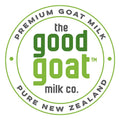Why the A2 Protein Makes Goat Milk Such a Game Changer

As you may or may not already be aware, there are many different kinds of milk—from cows, goats, and sheep; and there’s also plant- and nut-based milk like almond, soy, rice, and hemp milk. One of our favorite things about goat milk is its uniqueness, and one of the things that make it so unique is its chemical makeup.
The difference between each kind of milk’s chemical composition usually boils down to its point of origin. However, did you know that there are some other, less obvious distinguishing characteristics of milk? We’ll walk you through one of goat milk’s biggest advantages below.
For instance, milk features various kinds of protein, which can impact its digestibility, etc. The two most hotly debated proteins are called A1 and A2, with A2 being touted as the healthier protein. This makes the difference between milk with A1 protein and A2 protein not only important, but potentially crucial in picking a milk that’s healthiest for your body.
Don’t bleat yourself up over not knowing about any of this. We’ll make it simple.
Most milk contains both A1 and A2, but Goat milk is majority A2, which mostly leaves out the more problematic A1 protein. We’ll look at what the A1 and A2 proteins are and why they’re relevant in helping you select a better milk.
A1 and A2 milk defined
Milk features many different kinds of proteins, including one called casein. In fact, casein comprises nearly 80% of milk’s total protein content. Further, there are multiple forms of casein in milk, including beta-casein (which is the most common). Beta-casein itself also comes in several different forms, among which are A1 beta-casein and A2 beta-casein.
The A1 beta-casein protein is found in milk that originates in Northern Europe. A2 beta-casein is found in milk from the Channel Islands and Southern France.
Now, regular cow’s milk contains a varying mixture of both A1 and A2 beta-casein, whereas A2 milk contains only the bovine A2 beta-casein. Goat milk contains mostly A2 casein.
What’s the point? Why, or what, is the difference between milk with both beta-casein proteins, and A2 milk?
The distinction between regular milk and A2 milk
Studies have been conducted regarding the health benefits—or risks—of consuming milk with the A1 beta-casein protein. In many, A1 has been associated with harmful side effects, including diabetes, digestive problems, and heart disease.
There have also been ample animal trials linking the A1 beta-casein protein with adverse health risks, which has helped to frame the public’s perception of A2 milk as being the healthier choice. Research is still ongoing of course!
If milk containing the A1 protein has been shown to produce at least some adverse side effects in those who consume it, then A2 milk—milk without the A1 protein—is by comparison healthier for you.
The real benefits of A2 milk
For those who are lactose intolerant, milk is often the culprit. However, many of the studies conducted have specifically linked the BCM-7 opioid peptide released by the A1 beta-casein protein as being the cause of discomfort most often associated with lactose intolerance. Therefore, when a lactose intolerant person consumes A2 milk, there was no reported discomfort because there was no A1 protein present to release BCM-7.
By itself, A2 milk doesn’t provide any special benefits, but rather, it’s simply shown (in the observational studies that have been conducted so far) to be easier for lactose intolerant individuals to digest. If you experience any discomfort when you drink milk, drinking A2 milk could be an option—but only testing and time will tell.
This is just one of the many advantages of goat milk: it predominantly contains the A2 protein, which is why many who have an aversion to cow’s milk drink it instead. Trust us: we want you to lead a happier, more delicious life. We wouldn’t kid around about why goat milk is so great.
